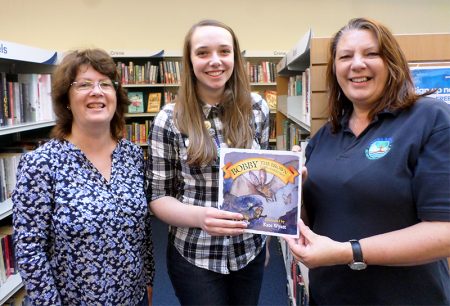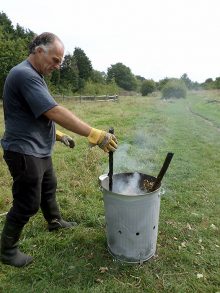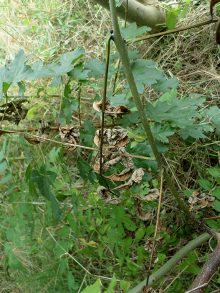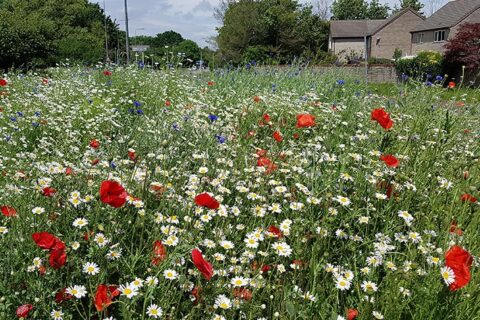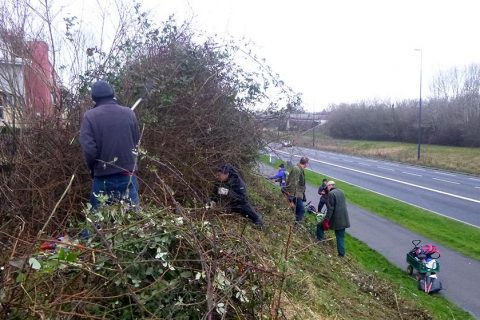An update from Sara Messenger of Bradley Stoke’s Three Brooks Nature Conservation Group.
All things batty!
Thanks to the generosity of Bradley Stoke Town Council, our ‘bat walks’, unlike those in many other places, are free to the public – although I’m sure their continued popularity has as much to do with Avon Bat Group’s Stewart Rowdon’s engaging manner as with the walks being accessible to everyone. After telling us some batty tales and sharing out the bat detectors, Stewart led 25 of us off into the darkness to see what we could find. We didn’t get very far, as we discovered that the bats were using the large oak tree in the grounds of the leisure centre as a roost, so we stopped there. Several of the lads from the skate park came over to see what we were up to with a couple of them being surprisingly knowledgeable on the subject.
Although we found many bats that evening, we again found none over the lake, which is usually teeming with pipistrelles, which are the smallest bat we have on the reserve. Whether this is to do with the tunnelling works there or the low level of water we’re not sure, and as the works won’t finish until after the bats have gone into hibernation, we won’t know until next year.
Four types of bat can be found on our reserve: pipistrelle, soprano, Daubenton’s and noctule. We found that if you point the detectors down into the long grass you can hear quite a lot going on, however it’s not a new breed of ‘grass bat’ that you’ve discovered, but the crickets whose chirping is at a similar pitch to the bats!
If you have missed our walks, you don’t have to miss out completely as at Bradley Stoke Library we have ten bat detectors available for loan, complete with guides and leaflets written by our own Gill Smith and John Morris. If you head off on your own we’d suggest you choose a dry night. Remember to wear sturdy footwear and take a torch (please don’t shine it at the bats) and be mindful that the leisure centre car park closes at 10pm!
To celebrate the 21st International Bat Night, we have also donated to the library the children’s book ‘Bobby the Brown Long-Eared Bat’, which is sold in support of the Bat Conservation Trust. Written by novelist A S Mills and beautifully illustrated by Kate Wyatt, the story follows young Bobby, his family of bats and his first journey in the outside world.
Ash dieback
Although the fungal disease ‘ash dieback’ has been around in the UK for five years, the reserve has been very lucky to have been spared an outbreak. Unfortunately, we have recently spotted signs of the disease in several saplings which are usually the first to succumb. As requested, we have reported the outbreak to the Forestry Commission and after taking further advice we are now operating a ‘slash and burn’ policy. Any trees that are infected are being cut down and incinerated on site in an attempt to limit the damage to our plantation. Although we are hoping for the best, we do need to be thinking about which species to replace the lost trees with.
Ash dieback is a disease of only ash trees and is caused by the fungus chalara fraxinea. It causes leaf loss and the crown to die back and usually leads to the death of the tree. Surveys have now confirmed the presence of the disease at more than 150 locations in England and Scotland, including established woodlands like ours.
Chalara fraxinea is being treated as a quarantine pest under national emergency measures and we would ask, to protect our reserve and others, that all users of the reserve give their boots a good wash before going to other places so that you don’t cross contaminate sites.
• For further information, visit our website (www.three-brooks.info), like us on Facebook (www.facebook.com/threebrooksncg), email info@three-brooks.info or phone 07497 006676.
Photos: 1 Conservation group members Gill Smith (left) and Sara Messenger (right) present a copy of ‘Bobby the Brown Long-Eared Bat’ to librarian Sarah. 2 Incinerating infected ash trees. 3 Tree with symptoms of ash dieback.
This article originally appeared in the October 2017 issue of the Bradley Stoke Journal news magazine (on pages 14 & 15). The magazine is delivered FREE, EVERY MONTH, to 9,500 homes in Bradley Stoke, Little Stoke and Stoke Lodge. Phone 01454 300 400 to enquire about advertising or leaflet insertion.

